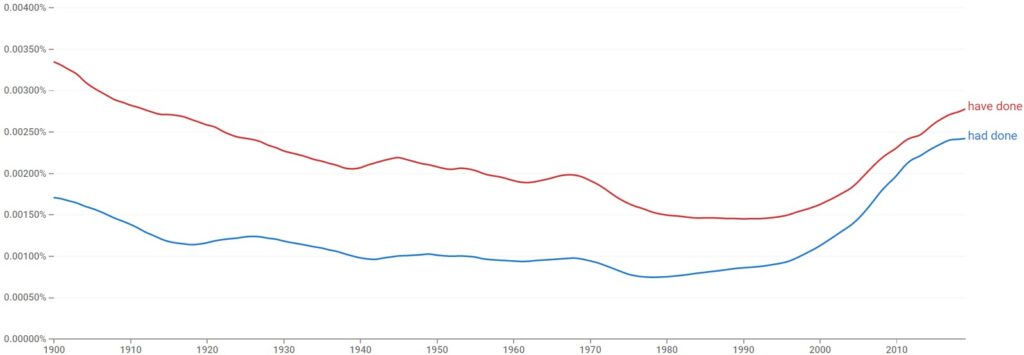Have you ever had difficulties making sense of past tenses and how to use them? For example, what’s the difference between “Had Done” and “Have Done”? We want to know when each of the forms should be used and what exactly they mean in a sentence.
Let’s find out.
Had Done vs. Have Done – What’s the Difference?
Both “Had Done” and “Have Done” express actions that happened in the past. “Have Done” is the present perfect tense, and indicates an action was just finished or finished in the recent past. “Had Done” is the past perfect tense, and expresses an action taken before another action.

Believe me when I tell you it’s less complicated than it sounds. Let’s start by looking at some examples:
- I have done the dishes.
- I had just done the dishes when Howard approached me.
The first sentence indicates the dishes are done. In fact, the present perfect form expresses that the dishes were done recently and possibly the action just finished. In this context, the correct form is “Have Done”.
The second sentence indicates that the dishes were done before Howard approached the subject. In other others, a second action (the approach) took place after the first action (doing the dishes) happened.
In that scenario, the correct form to use is the past perfect, and the correct form is “Had Done”.
Had Done
“Had Done” is the past perfect of the verb “Do”. It should be used to indicate that an action had been fished before a second action took place. The idea, simply put, is to express that action A was finished before action B happened.
To make better sense of how this works, let’s go over some examples of sentences that use the form “Had Done”:
- I had done the cleaning before I went to work.
- He had done the laundry before Anna, so she could take as much time as she needed.
- We had already done the organizing before the boss told us to.
- Liz had done her work and submitted it before it was due.
- Even before you reminded me, I had done the grocery shopping already.
“Had Done” will always make it clear that the action it is describing took place before another action in the past took place. The order in the sentence might be inverted (like in sentence 5) but the timeline is expresses will always remain clear.
If you’re talking about only one action, you should use the form “Have Done”.
Have Done
“Have Done” is a bit simpler than “Had Done”, because it can express one stand-alone action, without the need to think about what happened before or after. “Have Done” is the present perfect of the verb “Do” and should be used to indicate an action was just recently finished.
Take a look at the sentences in the examples, that use the form “Have Done”:
- I have done all my homework.
- John has done all his work for the week.
- Luana has done the dishes, so I didn’t have to.
- The janitors have done all the cleaning this morning, in case you haven’t noticed.
- I asked Jose about the report, and he told me he has done it already.
Which Is Used the Most?
Which one of those forms is used more often, “Have Done” or “Had Done”? Take a look at the graph from Google Ngram Viewer below.

“Have Done” is used more than “Had Done”, but just by a slim difference. It was actually interesting to see, in the graph, that both expressions follow the exact same trends over the years: when one goes up, the other follows, and vice versa.
As of now, both seem to be used almost at the same frequency. We think this makes sense, because “Have Done” and “Had Done” indicate different past tenses and, consequently, tell different stories.
Final Thoughts
Both “Have Done” and “Had done” are grammatically correct. Use “Have Done”, the present perfect tense, to describe actions that just took place and are recently finished. Use “Had Done” to describe an action finished in the past, that took place before another action that happened afterward.

Martin holds a Master’s degree in Finance and International Business. He has six years of experience in professional communication with clients, executives, and colleagues. Furthermore, he has teaching experience from Aarhus University. Martin has been featured as an expert in communication and teaching on Forbes and Shopify. Read more about Martin here.
